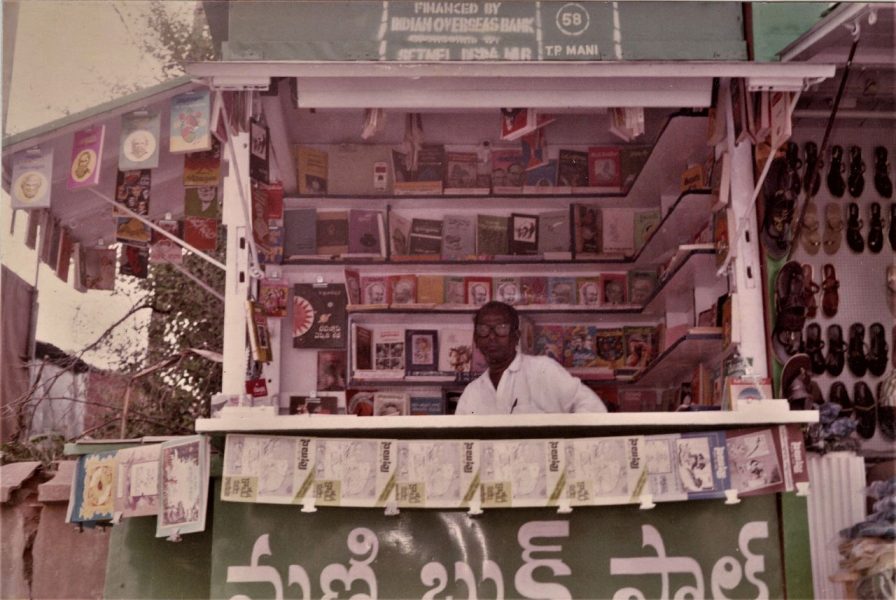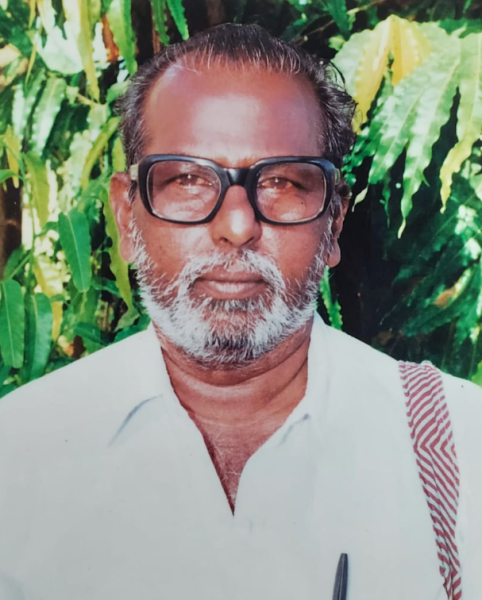
How TP Mani, a Malayali migrant, fostered a reading culture with a bookstore in Nellore

On June 29, a diverse group of people gathered in a rare gesture to pay homage to TP Mani, the owner of a small Mani Bookstall located in the crowded Sunday Market of Nellore city in Andhra Pradesh. They included poets, journalists, rationalists, political activists, women activists, doctors, campaigners of organ donation, and historians.
It was made even more remarkable by the presence of hawkers and vendors who, amidst their daily hustle, took the time to honour the bookseller. Three condolence meetings were organised in the past two weeks by the friends to recall how Mani struggled to make progressive literature available to the book lovers of the district and how he stood for the welfare of the vendors in the market.
A cultural hub
Tadepalli Bapu Mani, who came to Andhra Pradesh around 1947 as a migrant labourer from the Kollam district of Kerala, passed away at 93 at his son’s house in Kanekal of Anantapur district on June 16. His son, Dr. Durgesh, a paediatrician, donated his body to the Government Medical College in Bellary, Karnataka, as per his wish.
Mani Bookstall had been a sort of cultural hub for about eighteen years between 1980 and 1998. Leftists, rationalists, Buddhists, Dalit and women activists, and book lovers used to assemble there every evening. It was here that plans for many agitations were chalked out. From the Rationalist movement to the anti-arrack movement that rocked the district in the mid-eighties, there was no activity in the district with which Mani had no connection.
Also read: Pazha Athiyaman: ‘It’s surprising why Kerala didn’t focus on Gandhi’s role in Vaikom struggle’
A soft-spoken Mani was loved by all shades of political activists, and his bookstall remained witness to the post-emergency progressive movements in the district. Mani never ran the bookstore for profit, Aluru Raghava Sarma, a senior scribe from Tirupati, said. “He always strove to run the bookstore as a messenger to spread the reading culture. For any booklover visiting the city, Mani Bookstall was a must-visit,” Sarma said.
Though Mani was involved in many campaigns, the dearest to him was organ donation, said Tikkavarpu Sukumar Reddy, leader of the Nellore Organ and Blood Donation Campaign. Mani asked Sukumar Reddy to donate his organs to the needy and the remaining body to the medical college after his death. Mani wrote a will to this effect entitled Marana Aadesham (death decree) on the importance of organ donation in 1993.
Who was Mani?
Mani was born as Pankajakshan in the South Paravoor village of Kollam district in 1930. It is not known when and how he became Tadepalli Bapu Mani. But, at the age of 13, he disappeared from home and surfaced in Coimbatore, Tamil Nadu, where he started working as a labourer in a hotel.

Later, an Andhra businessman, who happened to observe Mani’s sincerity in the hotel during his stay, brought him to Kakinada and employed him in his house. Subsequently, he found a job at Khadi Board. He left the job and arrived in Nellore in 1975 with his wife Varahalamma and son where he used to supply bidis, cigarettes, biscuits, and other snacks to small shops on a bicycle.
Also read: How a woman dentist scripted the spectacular reinvention of Kerala’s X-rated Girija theatre
In 1977, well-known atheist Professor AT Kovoor visited the city and started his campaign to spread atheism and rationalism. Since Kovoor was also from Kerala, Mani attended his lectures and demonstrations which transformed him into an atheist and rationalist. He joined the newly formed Nellore Rationalists Association, and became a passionate campaigner for Blood and Organ Donation.
The new journey
Mani, though fluent in speaking Telugu, could not read and write. Still, he started distributing pamphlets and books of rationalist association, along with his mercantile. His rationalism brought him closer to the city’s intellectuals, writers, Left-wing activists, Dalit movement, Buddhists, blood and organ donation campaign and anti-arrack movement, and Leftist publishers like Hyderabad Book Trust.
“It was the resurgence of democratic spirit and the arrival of progressive literature after Emergency sparked an appetite in the unlettered hawker to learn to read and write Telugu. In the next three-four years, at around 50, he not only learnt reading and writing but also became a voracious reader,” Mani’s son Dr TP Durgesh told The Federal.
Another friend of Mani and associate in the book promotion endeavour, Dr Kalidasu Purushottam, said no book was displayed in the bookstall without him reading it first. He would give a brief introduction of the book to every buyer and difference of opinion was most welcome, Dr Purushottam, a retired principal, said.
Also read: How Jim Corbett typed his books, about man-eating tigers and leopards, with one finger
“In those days, we started a small reading room with English and Telugu magazines that include EPW and Seminar. Since Mani had already been circulating pamphlets and books, we encouraged him to become a full-time bookseller. As book reading was picking up, Mani also found the idea feasible for livelihood and suitable for his taste. He managed to get some space in the formative days of Sunday Market in 1980 and started ‘Progressive Bookstall’ first which later became Mani Bookstall,” said Dr Purushottam.
Sunday Market was the sanctuary for Tamil migrants who own most of the shops and pushcarts. On May 21, 1991, following news of the assassination of Rajiv Gandhi by Sri Lankan Tamils activists, the market fell victim to the wrath of miscreants who burnt it. Mani stood in the forefront to get the market restored with a permanent license and the market re-emerged like a phoenix from ashes. He fought for the welfare of the migrant vendors and became instrumental in the formation of the Sunday Market Committee to manage the Market.
The self-effacing man refused to write down a memoir when Hyderabad Book Trust requested him, stating there was nothing important to tell others about his life. While leaving Nellore in 1999 for his son’s place, he donated the shop to the Market Committee, which is still running it, without deviating from Mani’s ideals.


